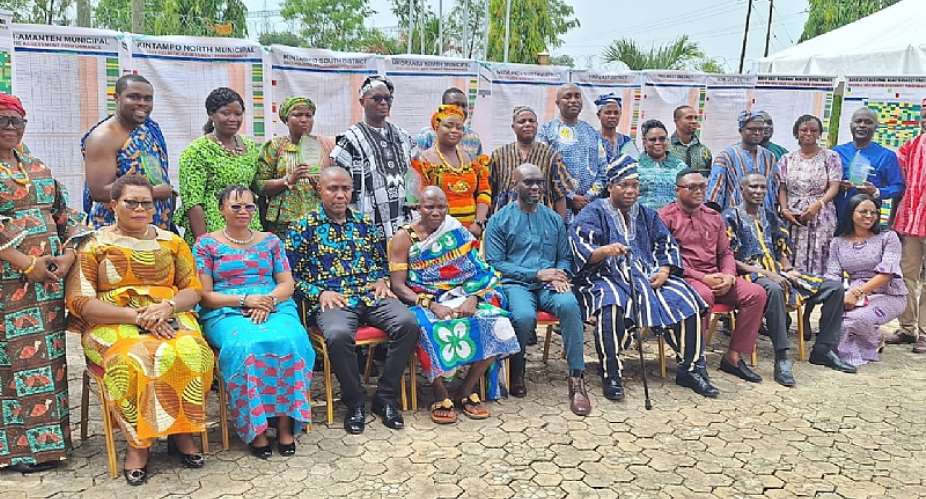The Bono East Regional Minister, Kwasi Adu Gyan, says effective primary health care delivery is Ghana’s approach to achieving universal health coverage, that is “all people in Ghana have timely access to high quality health services irrespective of ability to pay at the point of use.”
“In the past, Ghana’s efforts at delivering on its Primary Health Care focused on health system strengthening of the Community-Based Health Planning and Services (CHPS) and the district hospitals to the neglect of health centres. The health centres are to serve as a referral link between the communities, the CHPS zones and the district hospital,” he stated.
To address this gap, the Minister explained, the government’s current strategy is to reform and strengthen the primary health care system by upgrading health centres into model health centres, and forming networks of practice.
Mr. Adu Gyan said each model health centre staffed and upgraded to provide comprehensive services will serve as the hub for a network of other health facilities (spokes) within a defined geographical area, adding that “this will allow facilities in the network to share resources, use telemedicine to manage clients and improve referral systems.”
The Minister was addressing the Bono East Regional Health Directorate’s 2023 Annual Performance Review Meeting held at Kintampo under the theme “Building resilient structures for universal health coverage and quality: The role of networks of practice and partners.”
The Minister described the theme for the meeting as timely, as the country strives towards achieving universal health coverage by 2030, saying: “We need to develop health systems that are resilient and can provide quality health care to all, no matter one’s age, gender, disability or living place.”
Networks of practice
According to the Minister, Networks of Practice is therefore one of Ghana’s strategies to achieve universal health coverage at the primary level, with a focus on improving quality health services, partnership and innovation.
He also said one important component of the Networks of Practice is community ownership and partnerships, adding that different stakeholders such as the traditional authorities and opinion leaders, the District Assemblies, the National Health Insurance Scheme, the Health Facility Regulatory Authority, the National Ambulance Service and the Regional Coordinating Council have roles to play to actualize this strategy.
Newborn health
In his report, the Regional Director of Health Services, Fred Adomako-Boateng, noted that the proportion of births with skilled attendants do not automatically reflect in quality of childbirth care and might lead to false complacency about progress in maternal and newborn health.
He said since maternal and newborn health are administered through community health, primary care, and hospital care, achieving high-quality health systems requires expanding the space for improvement to structural reforms that act on the foundations of the system.
The Regional Health Director noted that apart from effective and timely care when sick, competent systems provide people and communities with health promotion and prevention. He added: “We are worried about the way and manner our cold rooms that store vaccines and equipment worth million of dollars suffer indiscriminate power disconnection. We all know these areas are of national security or because we do not see bombs, guns and demonstration, we think otherwise, we call on all stakeholders to conduct our activities with agreed terms, lives lost and disabilities from our action works against us achieving the SDGs.”
2013 Performance
According to him, the family planning acceptor rate in 2021 was 41.5%, 2022 was 40.2% and 2023 is 44% (The national target was 40%). The skilled delivery was 66.8% in 2021, 65% in 2022 and 66.1% in 2023 (Target of 60%).
The nurse to population, according to him, was 1:234 in 2022 as against 1:294 in 2023 (target of 1:450). The geographical equity index was 0.51 in 2022 as against 0.38 in 2023, (Target is 0.51).
“The doctor to population ratio was 1:20,397 in 2021; 1:9,101 in 2022 (1:9101 for 2022), and 1:12,898 (target 1:7500). The geographical equity index which improved from 0.04 in 2022 to 0.05 in 2023, it was 0.1 in 2021 (Target of 0.20).






 Pointing out the ills of NPP government not enough; tell us what you can do — Mi...
Pointing out the ills of NPP government not enough; tell us what you can do — Mi...
 April 27: Cedi sells at GHS13.78 to $1, GHS13.18 on BoG interbank
April 27: Cedi sells at GHS13.78 to $1, GHS13.18 on BoG interbank
 Worry about the furniture problem in basic schools; not how to paint schools in ...
Worry about the furniture problem in basic schools; not how to paint schools in ...
 Ramaphosa lauds ANC record as S.Africa celebrates democracy
Ramaphosa lauds ANC record as S.Africa celebrates democracy
 Ghana needs new counter-terrorism Act to tackle radicalised youth – CISA
Ghana needs new counter-terrorism Act to tackle radicalised youth – CISA
 Kumasi Central Prison triple its capacity to 1800 inmates
Kumasi Central Prison triple its capacity to 1800 inmates
 By-election: Ejisu is destined for NPP – Ahiagbah
By-election: Ejisu is destined for NPP – Ahiagbah
 Don't travel to volatile regions in northern Mali — Ministry of Foreign Affair t...
Don't travel to volatile regions in northern Mali — Ministry of Foreign Affair t...
 ILO’s claim of depleting reserves false, we have funds to pay pensions — SSNIT
ILO’s claim of depleting reserves false, we have funds to pay pensions — SSNIT
 Benin police fire tear gas to break up union protest
Benin police fire tear gas to break up union protest
